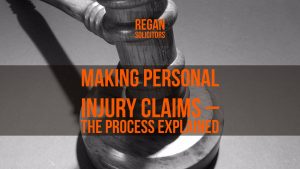

Welcome to our personal injuries advice blog series – an 8 week series that explains the processes you need to follow when making personal injury claims. Throughout the series we’ll cover various types of personal injuries claims and provide information to assist you with making a claim. In this blog article we’ll cover general information that you should be aware of when making any personal injury claim.
Making A Personal Injury Claim?
When a workplace, motor or public liability accident occurs it is common for an insurance company to attempt to settle all personal injury claims as quickly as possible. When you are injured it may seem that the most favourable option is to take the money offered and settle quickly. It is important to note that it is in the benefit of the insurance company to settle as fast as possible but this could easily result in you being under compensated.
In the early stages after an accident it is impossible to know the full extent of injuries and the suffering, both present and future that you may endure. That is why it is important to seek independent legal advice in the wake of an accident. This is the only way to ensure the compensation you receive is a true and accurate reflection of the harm caused.
Time Limits For Personal Injury Claims
The Civil Liabilities and the Courts Act 2004 sets the time limit for personal injuries claims for compensation at two years from the date of the accident.
Within two months of the accident occurring you should write a letter to the person you hold responsible for the injury notifying them of the nature of the accident and the wrong they have committed.
If you are within the time limits, Regan Solicitors can help you navigate your claim and take you through the steps of making a claim to get the best possible result for you. Contact us for assistance.
Submit Your Case To The Injuries Board
The first step in a personal injuries claim is to submit your case for assessment to the Injuries Board. The Injuries Board is an independent statutory body established under the Personal Injuries Assessment Board Act 2003. They provides independent assessment of compensation for personal injuries resulting from workplace, motor and public liability accidents. Cases of medical negligence are not assessed by the Injuries Board.
Procedure For Personal Injury Claims
You will have to fill in an application Form A (which can be done online at www.injuriesboard.ie) and have Form B (medical assessment form – download the form here) filled in by your doctor. You also have to submit to the Injuries Board all receipts for financial loss, copies of any correspondence between you and the person you hold responsible, a fee of €45 and any other documentation considered relevant to your claim.
When your application and supporting document have been received the Injuries Board will write to you acknowledging receipt and give you an application number.
The respondent receives notification of your claim from the Injuries Board. The claim is only assessed in cases where the respondent does not dispute liability and consents to the assessment by the Injuries Board. The respondent has 90 days to accept or decline the assessment by the Injuries Board. If they fail to respond they are deemed to have consented to the procedure.
If the respondent agrees to the assessment procedure, they must pay a fee of €600 to the Injuries Board.
In the event of the respondent refusing to consent, the agency will issue an authorisation and you can instruct Regan Solicitors to pursue your claim in court.
Medical Assessments
If the party does not dispute liability then the Injuries Board assesses your claim using all the medical evidence. In some cases the board may rely on your doctor’s medical report but if the Board has obtained its own medical report they will rely upon it. The Board also have regard to the Book of Quantum, which is a guide to the appropriate amount to be awarded in personal injuries cases.
When the Board have made their assessment the claimant has 28 days to accept or reject the reward. Acceptation must be acknowledged in writing to the Injuries Board. Failure to reply within the 28 days means you are deemed to have rejected the offer.
The respondent must accept or reject the assessment within 21 days. A respondent who does not reply within this time is deemed to have accepted the assessment.
If both parties accept, the claim is settled and an Order to Pay is issued to the respondent. If either party rejects the assessment, an Authorisation is issued allowing the parties to take their claim to court.
Contact Regan Solicitors For Personal Injury Claims Advice
At Regan Solicitors are with you every step of the way in making your claim. We are available to answer any questions you may have on of the above information. We can also answer any other questions you have related to personal injuries claims. Contact us today for an informative assessment of your case.
*In contentious business, a solicitor may not calculate fees or other charges as a percentage or proportion of any award or settlement

